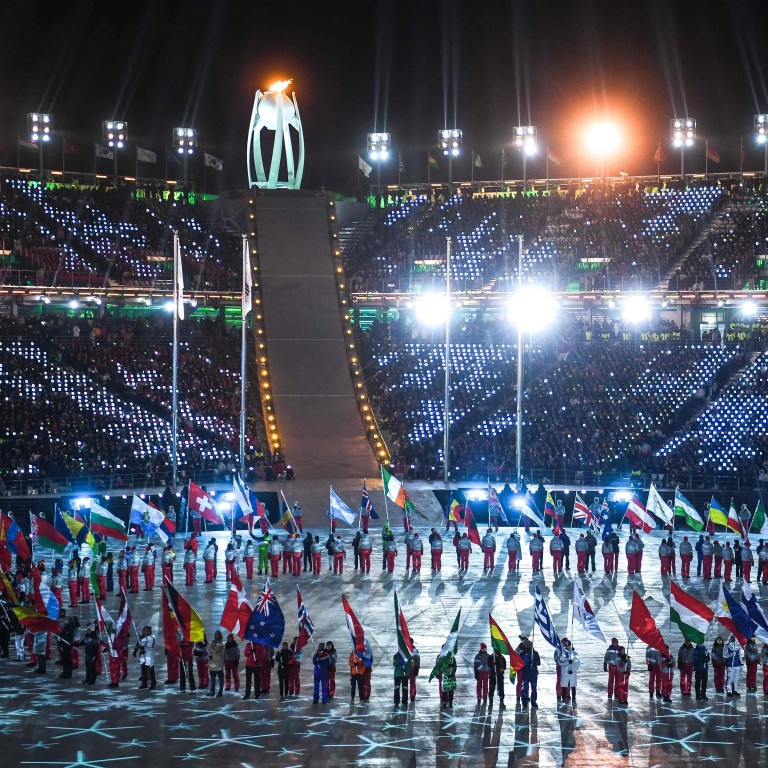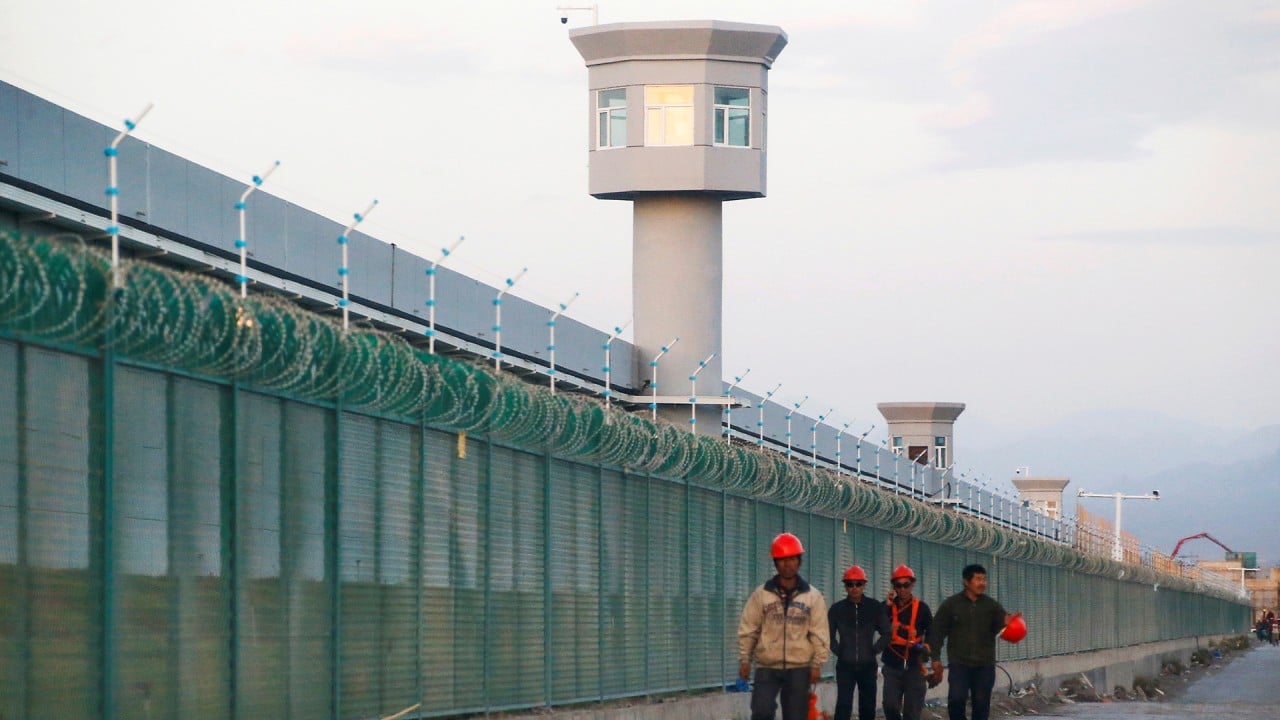
Could Beijing 2022 Winter Olympics be hit by boycott over Xinjiang Muslim camps?
- China has been accused of detaining more than a million Uygurs and other minorities in camps and faces increasing international outrage
- US senators have already called for a boycott and growing tensions with other Western countries could prompt further support for the measure
Beijing is set to become the first city in the world to host both the Winter and Summer Olympics, but calls for a boycott over its treatment of Muslim minorities in Xinjiang are now growing.
If it happens, it would be the first Olympic boycott since the 1980s and the Cold War, but rising tensions between China and the West mean the idea is no longer inconceivable.
Despite the growing swell of criticism – most recently over the Hong Kong national security law – the Chinese capital is continuing its preparations for the 2022 Winter Games as normal.

01:54
China hits back at UK claims of forced sterilisations and other human rights abuses against Uygurs
On Monday, a countdown clock was unveiled in Beijing to start warming up the public mood and all host venues have been ordered to be ready for test events by the end of the year.
China’s official budget for the Games is US$3.1 billion, and it has spent a further 58 billion yuan (US$8.2 billion) on a 174km high-speed rail line linking Beijing, where the ice skating and hockey events will take place, and Zhangjiakou, which will host most of the skiing events.

The 2008 Summer Olympics presented Beijing as a warm host, efficient organiser and cooperative global partner, according to Wang Yiwei, an international relations professor at Renmin University.
He said the 2022 event is intended to present the country as a peaceful and responsible country which has brought the coronavirus pandemic under control effectively,
“While a Cold War or decoupling with China may have be in fashion nowadays, the Olympic Games shouldn’t be targeted and politicised.”
“After all, China did not violate any international laws, unlike Moscow in 1980,” he said.
The Soviet invasion of Afghanistan in 1980 prompted a US-led boycott of the Summer Games that saw 66 countries stay away, including China.
In return, the Soviet Union and 17 other countries, mainly its Communist allies, boycotted the 1984 Summer Olympics in Los Angeles, citing security concerns and “chauvinistic sentiments and an anti-Soviet hysteria being whipped up in the US”.
Those calling for a boycott include US senator Marco Rubio, who said in 2018 that China should lose the right to host the Games because of the “dire human rights situation” in Xinjiang. Another senator, Rick Scott, introduced a bipartisan bill in March calling for another host to be chosen unless “significant improvements” are made in human rights by January 2021.
On Friday, the International Olympic Committee’s president Thomas Bach warned against boycotts, saying they only harmed athletes.
US sanctions Chinese government officials over treatment of Uygurs in Xinjiang
He later denied that he was referring specifically to Beijing 2022 and said he was confident China would uphold human rights.
While the International Olympic Committee has long insisted that politics and the Olympics should not mix, the 2022 Games are “indeed looming as a potential flashpoint”, said George Magnus, research associate at Oxford University’s China Centre.
“If the medal tables at the Winter Olympics 2018 in South Korea are anything to go by, China would definitely suffer if the top nations didn’t show up,” Magnus said.

At the 2018 Winter Olympics, more than half the gold medals were won by six Western nations: Norway, Germany, Canada, the US, the Netherlands and Sweden.
“All of the leading nations have strained relations with China already, notably Canada, the US and Sweden,” he said.
“The problem is that in times like these, countries have growing recourse to sanctions to express displeasure with or retaliate against the actions of China, and vice versa.
“Whether they would boycott the Games is a moot point, but since they know China will showcase them as it did the Summer Olympics in 2008 and as all nations do, the temptation to downplay or boycott will be strong,” he said.
Congress urges Trump administration to get tougher on China’s Xinjiang crackdown
The US is likely to be the key factor in determining whether a boycott goes ahead, especially given its influence over allies such as the other members of the Five Eyes intelligence pact, Britain, Canada, Australia and New Zealand.
Tensions between Beijing and the alliance have grown more fraught in recent months on technology, trade and ideology issues.
And the coronavirus pandemic, first detected in China last December, has become a new source of controversy as countries blame China for its mishandling at the early days.
Covid-19 has already led to the postponement of the Tokyo Summer Olympics until next year, meaning there will be a gap of less than a year before the Winter Games.
Last week the former IOC vice-president Dick Pound admitted that if the Tokyo Games had to be postponed or cancelled again, then Beijing 2022 would probably also have to be called off.
But even if that does not come to pass, Huang Yanzhong, a senior fellow for global health at the Council on Foreign Relations, a New York-based think tank said, that the pandemic could affect the 2022 Olympics by poisoning China’s relationship with the Western world.
“The prospect of a boycott becomes more likely if Covid-19 is still wreaking havoc by the fall of 2021,” Huang said.
The World Health Organisation has said that it may take four to five years to control coronavirus, while some US health experts have forecast that American life will not feel truly normal until the summer of 2022.
“As frustration and anger continue to grow, Beijing may become a lightning rod for criticism from politicians and pundits in the US and other Western countries,” Huang said.
“They may take advantage of the growing negative view of China to call for a boycott of the 2022 Beijing Winter Olympics.”

The success of any US-led boycott movement would very much depend on who is the US president in 2022, according to Jules Boykoff, a politics professor at Pacific University in Oregon.
“In the US, there have been bipartisan calls to boycott Beijing 2022, but it must be noted that such claims sit on a pretty firm foundation of hypocrisy, especially in this moment as activists standing up for black lives across the US are being repressed by local, state, and federal policing forces – ironically, this is happening as they protest police brutality,” Boykoff said.
“Were the US to try to rally a boycott movement, it’s not even clear they’d be able to muster a strong coalition, given the ever-plummeting status of the country’s reputation under the Trump administration,” he said.
Weaves ‘made from hair of China’s Xinjiang camp detainees’ seized on arrival in US
Sourabh Gupta, a senior fellow at the Institute for China-America Studies in Washington, said the US election in November could be key.
“Under a [Joe] Biden presidency, I would rate the chances of a boycott of the Games as remote, which under Trump, boycott is a possibility but still something of a long shot,” Gupta said.
He also cautioned that other events over the next 18 months – such as the fallout from the Hong Kong security law – would also drive sentiment, and the public enthusiasm for the Olympics should not be underestimated.
With Covid-19 already overshadowing the Tokyo Games, he said countries might not want to damage the fraternal ideals of the Olympic movement by having two Games in a row fall by the wayside or be damaged beyond recognition, he said.
“It is also worth pointing out that the boycott call is still mostly a Five Eyes fancy, and in no small part a product of the febrile … domestic politics within some of these countries,” he said.

However, Beijing needs to reflect on why it continues to remain so radioactive politically in the eyes of so many developed countries, he continued.
“It remains on notice with regard to its 2022 hosting. One more significant blunder on the lines of Xinjiang, and Beijing 2022 could turn out to be a somewhat lonely experience,” he said.
The United Nations has estimated more than a million Muslims have been detained in camps in Xinjiang for political re-education, but Beijing says they are vocational training centres aimed at countering religious extremism.
Last week the US imposed sanctions on several senior officials in charge of Xinjiang who were “believed to be responsible for, or complicit in, the unjust detention or abuse of Uygurs, ethnic Kazakhs and members of other minority groups in Xinjiang”.
On Monday, China announced the details of retaliation, sanctioning American officials and congressmen in the latest tit-for-tat confrontation.
China hits back, sanctioning US officials and Congress members in response to Xinjiang ban
Steve Tsang, director of the SOAS China Institute in London, said that apart from the US election result, whether there will be a large scale boycott also depends on China’s diplomacy.
“It would also depend on if Xi would sustain the ‘wolf-warrior diplomacy’, though the chance must be that he will. This will turn opinions in many countries and make the idea of a boycott more acceptable,” Tsang said.
“Wolf-warrior diplomacy”, named after a popular action movie series, has been used to describe the increasingly aggressive and confrontational stance adopted by some Chinese diplomats in their defence of the country’s interests.
“I do not see it as a foregone conclusion at this stage, but the risk that some form of a boycott may happen is real,” he said.

Pang Zhongying, an international affairs analyst at the Ocean University of China, said that no matter who wins the US election, the likelihood is that Sino-US relations will become more strained.
“China’s relationship with European countries is shaky and some European countries are even more radical on human rights issues than the US.
“Speaking of China’s relations with member countries of the Belt-and-Road Initiative [a transcontinental infrastructure plan], I’m deeply worried about worsening relations brought about by a debt crisis which is unfolding as a result of the coronavirus in African countries,” Pang said.
“It’s a real concern that the 2022 Olympics may encounter a large scale boycott or even be forced to cancel … after China has splurged for the Games,” he said.

